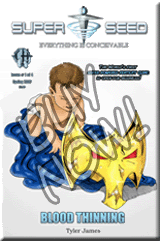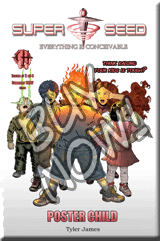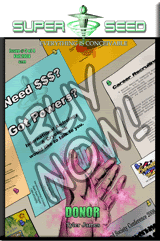*****************************************************************
JK: Tell me a little bit about yourself — is this your first comic-creating experience, or have you done other work in the field? What do you do when you aren’t creating comics?
Tyler: The Interrogation Control Element (ICE) creative team is four strong. It was conceived and written by me, Tyler James, who Zudaheads may remember from April 2008’s competition, where my comic Super Seed finished 4th (behind two eventual Zuda contract winners.) I’ve been writing and drawing comics for most of the last fifteen years, and am currently the writer/artist of Over, a romantic comedy online graphic novel that debuted last month, and Tears of the Dragon, a fantasy epic, which began its weekly run the 14th of July. When not making funny books, I work as a video game designer and content produce for a small software company, and teach making comics to kids and adults.
and written by me, Tyler James, who Zudaheads may remember from April 2008’s competition, where my comic Super Seed finished 4th (behind two eventual Zuda contract winners.) I’ve been writing and drawing comics for most of the last fifteen years, and am currently the writer/artist of Over, a romantic comedy online graphic novel that debuted last month, and Tears of the Dragon, a fantasy epic, which began its weekly run the 14th of July. When not making funny books, I work as a video game designer and content produce for a small software company, and teach making comics to kids and adults.
I’ve been joined on ICE by the kick ass art team of penciller/ inker Damian Couceiro and colorist Paul Little. Damian is an award winning artist from Argentina, who is most known for his work on Joe Casey’s Full Moon Fever, for AIT Planet Lar. Paul is a workhorse colorist who has made pretty such titles as Bomb Queen (Shadowline/ Image Comics), Dynamo 5 (Image Comics) and The Matriarch (Arcana Studios). (I’ve also grabbed him for work on Tears of the Dragon. He’s too good!) And rounding out the team is editor Steven Forbes, who is copy-editor of Warmageddon Quarterly, co-writer of indy hit Fallen Justice, and writer of two must-read columns for any aspiring comics writers, Bolts & Nuts and The Proving Ground.
JK: What’s your comic about, and where did the idea for it come from?
Tyler: ICE is a story that was inspired by a New York Times article about Deuce Martinez, the CIA interrogator who broke Al Qaeda mastermind Khalid Shaikh Mohammed. Unlike his colleagues, who were using “enhanced interrogation techniques” to try to break prisoners, Deuce took a different, more cerebral approach. And he was incredibly effective and got the guy talking.
I thought such a character could make for a compelling protagonist. And as I started doing my research on interrogators in the war on terror, it was clear there was a very powerful story to be told here, and one that we haven’t seen much of in film or comics.
As for the story, ICE takes place in a post-Guantanamo Bay world and tells the story of Trip Higgins, a brilliant senior interrogator for the U.S. military. Trip was one of the most effective interrogators in Iraq and Afghanistan earlier in the decade, a by the book kind of guy who used his wits, psychological ruses, and other legal means to consistently break prisoners and provide valuable, accurate intel to his superiors. However, as other interrogators seemed to rely more on those so called “enhanced interrogation techniques” and his superiors turned a blind eye, Trip became disillusioned with his work and left the military.
Jump forward several years and a new administration, and Trip is chosen to become the senior echo (chief of interrogators) of a new Interrogation Control Element on American soil. Here, Trip will be training a young group of ‘gators how to break the nation’s most valuable (and in some cases deadliest) prisoners, within the bounds of the Geneva Conventions. Some of the young interrogators will be extremely wet behind the ears, while others have done this job in the past and may have a different view on the effectiveness and legality of enhanced interrogation, creating conflict with Trip.
Trip’s counterpoint is Fazul Shallah, a brutal extremist who, after an eight month stint in an Afghan prison, decides to eliminate the leadership of his multi-national terrorist organization and assume control himself. Once he’s solidified his control, Shallah coordinates a series of terrible terrorist attacks and soon becomes Trip’s team’s number one priority. When faced with such a ruthless enemy, Trip’s by-the-book tactics and respect for the rule of law will be tested, and the two men with diametrically opposed views are set on a collision course.
JK: How much of your story do you have mapped out at this point, beyond the eight pages that you submitted to Zuda? And how did you decide what to put into those eight pages?
Tyler: Well, there are another couple of pages already drawn by Damian and ready to go, but that was more because I decided I wanted to swap in a different short scene within my crucial eight submission pages. The story is mapped out. I’ve written it as if it were a limited graphic novel series or a feature film. So, all of the major beats, highs and lows, beginning middle and end, etc. are mapped out and a few choice sequences are detailed. Damian’s also been working on some character designs for the rest of our cast who didn’t make the initial 8 pages. But, should we win, I’ll definitely have some full-scripting to do. (But hey, that’s what they’re paying us for, right?)
As for what to include, I think I was able to squeeze as much story into the initial eight pages as I could without going overboard. I felt I needed to set up the world, firmly establish the protagonist, introduce the main antagonist, and set the table for what’s to come. It was important I also gave Damian the chance to show off his chops artwise, and I think he delivered.
JK: What are you doing to market your comic this month?
 Tyler: What aren’t I doing to market this thing? I pretty much feel that’s all I’ve been doing for the past week. There’s Twitter posts and updates (you’re following me at @tylerjamescomic, right?) I’ve been doing some on the fly contests through Twitter and hooking people up with some gorgeous ICE prints. I’ve been running some Project Wonderful ads, but I’m determined not to blow my whole DC Comics check on marketing this time around. (That’s the sneakiest thing about the Zuda business plan. Their outlays paying contestants for their work double as advertising. Pretty brilliant.)
Tyler: What aren’t I doing to market this thing? I pretty much feel that’s all I’ve been doing for the past week. There’s Twitter posts and updates (you’re following me at @tylerjamescomic, right?) I’ve been doing some on the fly contests through Twitter and hooking people up with some gorgeous ICE prints. I’ve been running some Project Wonderful ads, but I’m determined not to blow my whole DC Comics check on marketing this time around. (That’s the sneakiest thing about the Zuda business plan. Their outlays paying contestants for their work double as advertising. Pretty brilliant.)
Additionally, I whipped up a super cool trailer that has gotten a ton of hits over on YouTube. Watch it. It’ll tingle those patriotic goosebumps Americans get when we here The Star Spangled Banner. I’ve banner ads on all my comic sites, and I’m currently running new content on FOUR different comic sites concurrently with the Zuda contest. So, check out Over, Super Seed, Tears of the Dragon, and CounterTerror if you need more comic goodness from me.
You know, despite the international nature of Zuda competitions, this is not American Idol. It doesn’t take a million votes to win. In fact, it’s more like a high school student body election. But you gotta work for those votes. The “best” comic has no guarantee to win. In fact, you can guarantee the “best” comic won’t win if they don’t match the intensity and hard work they put into the submission with beating the bushes to get the word out.
JK: So no matter how great all the submissions are in a given month, there can be only one. Even if you don’t win, do you plan to continue with your strip in another venue?
Tyler: That’s a great question. You know, the sad part of Zuda, is that there are a whole host of comics that were well-regarded, found an audience, clearly of quality, and yet came up short. The graveyard of Zuda runner-ups is full of a lot of good comics.
From a creator’s standpoint, something bugs me about creators putting a ton of work into their comic, promoting the holy hell out of it, getting positive, constructive feedback on it, and then abandoning it completely because they aren’t going to get the Zuda contract. As if Zuda is the be all and end all of webcomics.
Don’t get me wrong, I love Zuda and I think it would be a tremendous opportunity. But there are SO many other things you can do with your comic properties! For example, I launched Over, a webcomic I’m self-publishing on its own site, overcomic.com, last month and it ended up getting about three times as many page views in a month as Super Seed did when it competed on Zuda. And that’s without heavy advertising, the draw of the competition and the marketing might of DC/Warner Bros. Yes, Zuda is good exposure, but it’s still just a small portion of the vast ocean that is webcomics.
All that being said, we may not choose to go full steam ahead with ICE should we not win the Zuda contract. This is for two reasons. First, ICE is a hard book to write. Writing realistic fiction, dealing with highly controversial, straight from the headlines topics, without any supernatural, suspension of disbelief stuff, is very very difficult. Because, the more realistic the world setting you’re writing, the quicker people are to call bullshit on something that seems far fetched or inaccurate. With a jovial ribbing, this isn’t a problem with entries where you have a talking lab rat and a car-driving monkey. Pretty much anything goes at that point. (I am a fan, though, Mr. Bivens.) Second, ICE is an expensive story to produce. Regardless of whether or not ICE is your favorite submission, from the comments thread on Zuda, there is pretty much universal agreement that this is a professional, quality submission. Professional work costs money. Damian and Paul both cut me a deal on page rates for the Zuda submission and were awesome to do so. Guys, Damian is a star in the making and the sky is the limit for this guy. And Paul is coloring God knows how many books every month. These guys more than earn their paychecks. Unfortunately, at the moment it would be awful tough for me to pay them what they’re worth and foot the bill for a run of the full mini-series/graphic novel, without a publishing deal lined up. (Hint, hint, publishers.)
Regardless though, the story will get told. This will probably be the next feature length screenplay I write. (Everyone says you need at least two spec scripts…I only have one at present.) But I would absolutely LOVE to continue it on Zuda, and for the rest of the month, I’ll be doing everything in my power to make that happen.











No comments:
Post a Comment